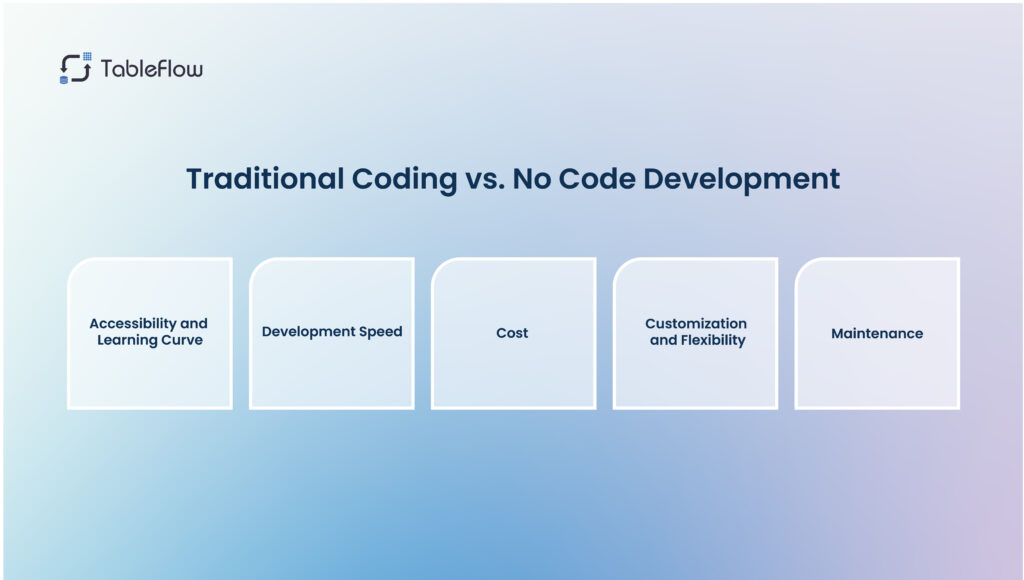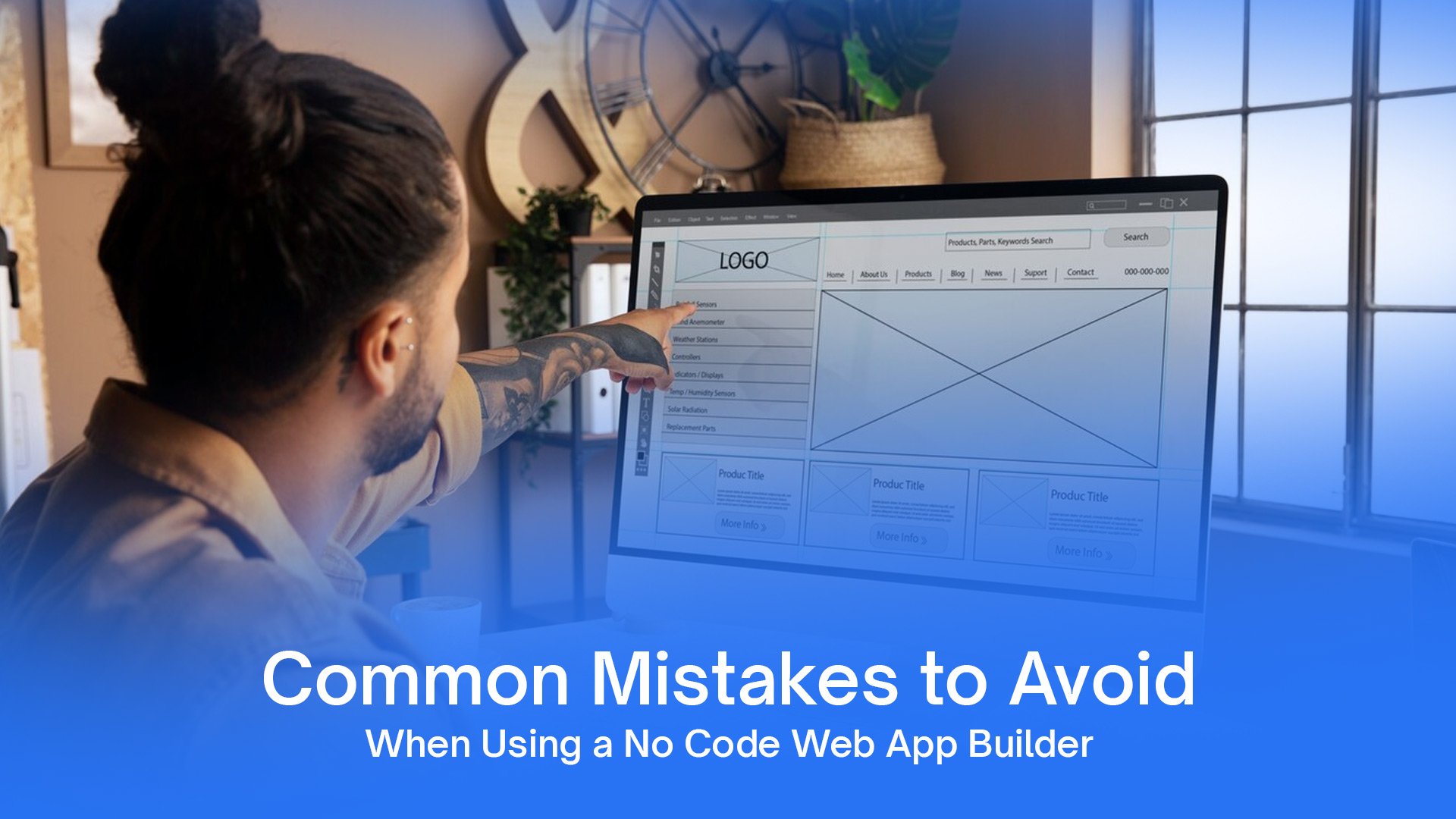
The Future of Development: Why No Code Web App Builders Are Here to Stay
Tableflow Team | November 6, 2024
The digital landscape is evolving at a very fast pace, and along with it, the technologies used to build websites and web applications are also getting more rapid. One of the most powerful shifts in recent years has been the rise of no-code web app builder, which have changed the world. These no-code platforms empower individuals and businesses to create fully functional web applications without the need for traditional programming knowledge. But are these no-code platforms here to stay? Let’s explore this in detail.
The demand for web applications is higher than ever. Businesses of all sizes require an online presence, and many seek customized web applications to meet specific needs. In earlier times, this meant hiring developers and investing time and resources into coding. With Web app builder no-code platforms, it has become a totally different game. It is democratizing the development process and making it accessible to non-technical users.
History of Web Development
The journey of web development began in the early 1990s with the advent of HTML, which allowed developers to create static web pages. As the internet grew, so did the complexity of websites. This led to the development of CSS for styling and JavaScript for interactivity. The early 2000s saw the rise of dynamic web applications powered by server-side languages like PHP, Ruby, and Python, with databases such as MySQL and PostgreSQL.
With time and increasing usage of mobile devices, responsive design came to the market. Frameworks like Bootstrap and AngularJS gained popularity. Despite these advancements, web development remains a specialized field which requires extensive coding knowledge and experience.
History of No-Code App Builders
The idea to develop web application without coding didn’t emerge overnight. It evolved from early versions of website builders, which allowed users to create websites using graphical interfaces. The real development started happening after the 2010s, which was marked by the accessibility to a broader audience.
No-code app builders took it further by enabling the creation of complex web applications. These tools allowed users to build fully functional applications with little to no coding, significantly lowering the barrier to entry.
Traditional Coding vs. No Code Development
Accessibility and Learning Curve
Traditional coding requires extensive knowledge of programming languages, frameworks, and development environments. It takes years to become proficient in it.
No code is designed to be user-friendly. The intuitive interfaces and pre-built components allow users to create applications quickly without prior coding experience.
Development Speed
Traditional coding is time-consuming, as developers need to write, test, and debug code. Complex projects can take months or even years to complete. No code is significantly faster, as users can leverage pre-built templates and components, reducing development time from months to hours.
Cost
Coding requires hiring skilled developers, which can be expensive. Ongoing maintenance and updates also add to the cost. No code is more cost-effective, as businesses can create and maintain applications in-house.
Customization and Flexibility
Traditional coding offers unlimited customization and flexibility, as developers can write code to meet specific requirements. While no-code webapp builder platforms are becoming increasingly customizable, they may still have limitations compared to traditional coding.
The old method requires ongoing maintenance, including updates, bug fixes, and security patches, which can be resource-intensive. No code is easier to maintain, as platforms often handle updates and security patches automatically.

No-Code App Builders for Business
No-code Web App Builders offer solutions for many business needs. They enable companies to innovate faster, reduce costs, and remain competitive in an increasingly digital landscape.
Effectiveness
No-code platforms reduce development costs by removing the need for expensive programming expertise. This allows businesses to allocate resources to other critical areas.
Rapid Development and Deployment
These tools enable the quick creation and launch of web applications, reducing time to market. This allows businesses to respond to market demands or opportunities.
Empowerment of Non-technical Staff
No-code solutions allow employees without programming skills to contribute to app development.
Increased Agility
Businesses can quickly iterate and make changes to their applications without relying on IT departments.
Reduced Technical Debt
No-code platforms often come with built-in best practices and standardized components.
Focus on Core Business Logic
No-code tools allow businesses to focus on their unique value propositions and business logic.
Prototyping and MVP development
These platforms are ideal for quickly creating prototypes or minimum viable products (MVPs).
Integration Capabilities
Many No Code platforms offer pre-built integrations with popular business tools and services, streamlining workflows and data management.
Scalability
As businesses grow, many No-code platforms can scale with increased users and data.
Conclusion
No-code web app builders are here to stay. They offer solutions for businesses and individuals looking to build web app without code, cost, and complexity. While they may not entirely replace traditional development, especially for highly complex or unique projects, they provide a valuable alternative in the development process.
As no-code platforms continue to evolve, offering more features, flexibility, and integration, their appeal will grow. No-code gives power to everyone to create web application without coding. Whether you’re a small business owner looking to create an online store or an entrepreneur with a vision for the next big app, no-code web app builders offer the tools you need to succeed in today’s digital world. Welcome to the future of web development – no code required.






